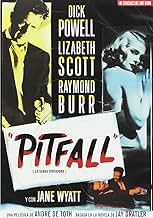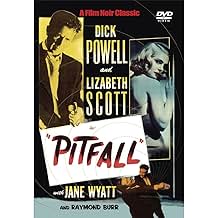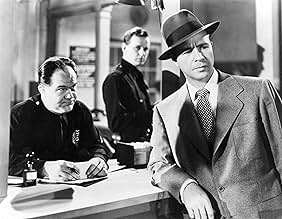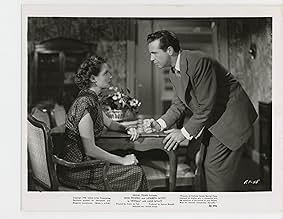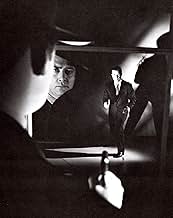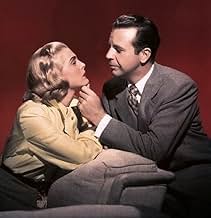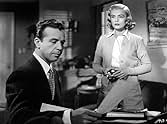Der verheiratete Versicherungssachverständige John Forbes verliebt sich in die Femme fatale Mona Stevens, während ihr Freund im Gefängnis sitzt, was schwerwiegende Folgen für alle Beteiligte... Alles lesenDer verheiratete Versicherungssachverständige John Forbes verliebt sich in die Femme fatale Mona Stevens, während ihr Freund im Gefängnis sitzt, was schwerwiegende Folgen für alle Beteiligten hat.Der verheiratete Versicherungssachverständige John Forbes verliebt sich in die Femme fatale Mona Stevens, während ihr Freund im Gefängnis sitzt, was schwerwiegende Folgen für alle Beteiligten hat.
- Auszeichnungen
- 1 wins total
- Desk Sergeant
- (as Dick Wassel)
- Prison Visitor
- (Nicht genannt)
- Fashion Show Attendee
- (Nicht genannt)
- District Attorney's Man
- (Nicht genannt)
- Man in Diner
- (Nicht genannt)
- Bartender
- (Nicht genannt)
- Police Lieutenant
- (Nicht genannt)
Empfohlene Bewertungen
Powell is brought a report on a claim that one of the hired investigators Raymond Burr has. Byron Barr has embezzled money that Powell's insurance company is covering. Barr has spent the money lavishly on presents for Lizabeth Scott. Powell has to check this one out for himself. Of course he meets Lizabeth Scott and nature takes its course. Barr mean time is serving time in jail and Raymond Burr has decided to stake out Ms. Scott for himself. Or maybe the right word is stalk.
So we've got Barr serving, Burr stalking, Powell cheating, what's this Lizabeth Scott got to get all these guys hormones working in overdrive?
My description of Pitfall may have been flip up to now, but it really is a fine drama with no real heroes in it, except maybe Jane Wyatt. The best performance in Pitfall goes to Raymond Burr who is really a malevolent figure with his obsession about Scott.
Waiting for him in his office is `Gruesome,' private investigator Raymond Burr, who's done some legwork concerning a convicted felon who has defrauded the company. The felon (Byron Barr) squandered most of his ill-gained money showering his girlfriend (Lizabeth Scott) with furs, an engagement ring and even a little speedboat. Burr, in the course of his sleazy sleuthing, has taken quite an obsessive fancy to her, but Powell warns him off, saying he'll wrap the case up himself.
At first Scott dismisses Powell as just `a little man with a briefcase,' an assessment that tallies too well with his own worst self-image. But to no one's surprise, in this climate of Pacific air and marital dissatisfaction, he ends up taking his own fancy to her, one that turns out to be mutual. They tear around the harbor in her boat, then fritter away the rest of the afternoon in a dim cocktail lounge. He doesn't get back to hearth and home till the wee small hours.
One night when his son is awakened by nightmares, Powell lectures him: `Take only good pictures and have only good dreams.' It's a case of do what I say, not what I do. By veering off from the straight and narrow, Powell has set into motion a chain of baleful events. The vindictive Burr assaults him outside his garage. Scott discovers that Powell's been hiding his life as a married father. Ex-cop Burr starts visiting Barr in stir, sowing seeds of jealousy and plans for revenge. Events converge one dreadful night with an unplanned pair of killings that leave the quick, arguably, worse off than the dead....
Jay Dratler's script (from his own novel) shows a progressive streak in dealing with the short and unpredictable fuses of controlling, potentially violent males stalkers. The script also serves the assembled cast well. True, there's not much to be done with Wyatt, with her cap-sleeved house-dresses and finishing-school elocution, but she's more plausible than she would be two years later as a highly unlikely femme fatale in The Man Who Cheated Himself. Here, she's the distaff side of those male dictators, a wife whose ideals of suburban decorum are chiseled into cold marble (she's a faint forerunner of Joan Crawford's Harriet Craig).
But Powell gets to tap deeply into his key emotion, snappish discontent, and lets it deepen into something close to small-time tragedy. Scott, always an iconic presence but an actress with limits, finds a comfortable part as a bewildered and vulnerable victim of the men who come into her life, bidden and unbidden. Burr, billed fourth (after Wyatt!), possibly fares best. Much in demand in the late 40s as one of the creepiest heavies, he earned that demand by providing extra (and maybe unasked-for) dimensions to the thugs he played. Like the giant Fafner in Das Rheingold, he lets a bit of yearning, of desperation, show under all his intimidating bulk (and in sheer avoirdupois, it's one of his biggest roles).
De Toth, better remembered for his westerns and 3-D horror pix like House of Wax, made, in Pitfall, one of the more distinctive titles of the noir cycle. Not often mentioned in top-ten lists, even those of black-and-white crime films of the post-war era, it has the effrontery to situate deceit and duplicity and betrayal where it surely ought not to belong not in road houses or tenement flats but right at the heart of a storybook American family (it's one of the more subversive films of the era).. Yes, there are lapses, chief among which is a score that keeps trying to crack corny little jokes. But in the denouement far from unleashing a hideous storm of terror, De Toth opts for cold detachment he casts a chill that lingers still.
Dick Powell plays an insurance investigator named John Forbes. His life is very routine and he makes a point (perhaps too much of a point) of beginning the film complaining about how routine his life is. Soon, he meets a woman on a case, Mona Stevens (Lizabeth Scott) and they begin seeing each other--which is a problem since Forbes is married. However, before it goes very far, she breaks it off with him when she learns he's married.
This is not the end to it, though. An insane private investigator (Raymond Burr) is infatuated with Mona and MUST have her. And, when he follows her and sees her with Forbes, this maniac decides to threaten to expose Forbes unless she agrees to be his girl. When this doesn't work, he beats Forbes senseless. And, when that doesn't seem to work, he goes to Mona's old boyfriend and gets the man worked up--so worked up that the old boyfriend comes gunning for Forbes. What's next? See this dark little film to see.
So is this film worth seeing? Yes, though it's far from perfect. As far as the good goes, Raymond Burr is wonderful and is really in his element playing this creepy and sociopathic jerk. He was great in this sort of role and played it in several other films, such as "The Blue Gardenia". Also, the basic story idea is good. However, the film is flawed--seriously flawed. This is because the entire film is based on characters who repeatedly make stupid choices. Any semi-sane man would have told their wife about what had happened or at least they would have gone to the police after they were assaulted and threatened. Many times he COULD have stopped the threats, attacks and eventual catastrophe that occurs at the end--a weakness in an otherwise enjoyable little noir movie. On balance, the good does outweigh the bad.
Powell, who began his screen career in movie musicals at Warner Brothers in the 1930s, established himself a decade later as a fine dramatic actor starting with MURDER, MY SWEET (RKO Radio, 1944) in which he played private eye, Philip Marlowe. Other dramatic roles followed, including CORNERED (RKO, 1945) and JOHNNY O'CLOCK (Columbia, 1947), that formulated Powell as a 1940s tough guy, but it is PITFALL that is equally as good as his previous dramatic efforts combined. Powell's Johnny Forbes is someone who can very well be any average man, bored with life and unsure of himself. A well-scripted drama based on "The Pitfall" by Jay Dratner, with able support by Jane Wyatt as his caring but somewhat suspicious wife; Lizabeth Scott as a tough girl with the raspy voice whose life meets with further obstacles when unwittingly falling in love with a married man, but it's Raymond Burr's role that goes without question, predating Robert Mitchum's performance in CAPE FEAR (1962), as a creepy stalker who won't take no for an answer when it comes to getting someone he wants. His crucial moments include beating up Forbes in front of his home as he warns him to stay away from Mona; his constant stalking of Mona at both job and home; and even going to her boyfriend in prison with intentions of getting him jealous with envy over Mona. Also in the cast are Ann Doran as Powell's secretary; Selmer Jackson as Ed Brawley; and former Warner Brothers contract player John Litel in one scene as a district attorney with advise to Powell's character what he should have done to avoid his pitfall of murder. Had he done that, there would have been no movie, no story, no PITFALL.
What originally attracted me to watching PITFALL when televised in the late 60s/ early 70s on the afternoon movie was actually getting to see Raymond Burr, whose prime time IRONSIDE TV show along with reruns of his popular TV series "Perry Mason" has made him into a public figure among TV personalities at that time. As much as Burr nearly acquires more attention than his leading players, I was equally impressed by its leads, Powell and Scott. I was even more surprised later on when I came across an early musical, 42nd STREET (1933) to find this to be the same Dick Powell from PITFALL as the baby faced singer introducing the hit tune, "Young and Healthy." There's no singing this time around, not even that of Raymond Burr crooning, "I've Got You All to Myself" to Lizabeth Scott listening to him attendedly with disgust. Overall, PITFALL is straight drama that doesn't let up for an instant. Aside from Powell's low-key character, there's Jane Wyatt, whom I've grown to know from her 1950s TV series, FATHER KNOWS BEST starring Robert Young, as a wife and mother, who, unlike housewives of the day, is a little ahead of her time as the one who drives her husband to work. Her emotions, especially its conclusion, are well handled and realistically done for its time.
Of the handful of classic "film noirs" that turned out in the 1940s, PITFALL is one that's virtually unknown to many due to lack of television broadcasts. Had it starred stronger names as Humphrey Bogart and Lauren Bacall, or Alan Ladd and Veronica Lake for that matter, in the Powell-Scott roles, chances are PITFALL would be a well known classic from the 1940s, but as it turns out, entire production, including actual location footage of Los Angeles, makes this worth viewing. Rarely televised since the 1970s, PITFALL did see the light when distributed on VHS through Republic Home Video in 1991, and many years later on Turner Classic Movies, September 2, 2013. (***1/2)
Wusstest du schon
- WissenswertesThis was independently produced by Regal Films and released through United Artists. For decades, the film was rarely seen. It can be seen today through the preservation efforts of the UCLA Film and Television Archives.
- PatzerThe public elevator indicator in the Los Angeles Hall of Justice building shows floors 1 to 19. However, in reality, the building is only 14 stories tall.
- Zitate
Tommy Forbes: Dad was a boxer in college!
Doctor: I think he was wise to go into insurance.
Doctor: [handing a prescription to Sue Forbes] Take this up to the drug store.
Sue Forbes: What is it?
Doctor: A course in boxing.
- VerbindungenFeatured in Noir Alley: Pitfall (2018)
Top-Auswahl
Details
- Erscheinungsdatum
- Herkunftsland
- Sprachen
- Auch bekannt als
- Die Falle - Pitfall
- Drehorte
- 5424 Bradna Drive, Los Angeles, Kalifornien, USA(Forbes Family Home)
- Produktionsfirma
- Weitere beteiligte Unternehmen bei IMDbPro anzeigen
Box Office
- Budget
- 1.000.000 $ (geschätzt)
- Laufzeit
- 1 Std. 26 Min.(86 min)
- Farbe
- Seitenverhältnis
- 1.37 : 1


